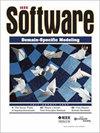Bringing Software Engineering Discipline to the Development of AI-Enabled Systems
IF 3
4区 计算机科学
Q2 COMPUTER SCIENCE, SOFTWARE ENGINEERING
引用次数: 0
Abstract
Engineering AI Software systems is starting to evolve from the pure development of machine learning (ML) models to a more structured discipline that treats ML components as part of much larger software systems. As such, more structured principles are required for their development, such as established design principles, established development models, and safeguards for deployed ML models. This column focuses on papers presented at the Third International Conference on AI Engineering—Software Engineering for AI (CAIN 2024). The selected papers reflect the current development of the field of AI systems engineering and AI software development, taking it to the next level of maturity. Feedback or suggestions are welcome. In addition, if you try or adopt any of the practices included in the column, please send us and the authors of the paper(s) a note about your experiences.将软件工程学科引入人工智能系统开发
人工智能软件系统工程正开始从纯粹的机器学习(ML)模型开发发展成为一门结构更加严谨的学科,将 ML 组件视为更大软件系统的一部分。因此,这些系统的开发需要更多结构化的原则,如既定的设计原则、既定的开发模型和已部署 ML 模型的保障措施。本专栏主要介绍在第三届国际人工智能工程会议--人工智能软件工程(CAIN 2024)上发表的论文。所选论文反映了当前人工智能系统工程和人工智能软件开发领域的发展情况,并将其推向下一个成熟阶段。欢迎提出反馈意见或建议。此外,如果您尝试或采用了专栏中的任何做法,请向我们和论文作者提供您的经验。
本文章由计算机程序翻译,如有差异,请以英文原文为准。
求助全文
约1分钟内获得全文
求助全文
来源期刊

IEEE Software
工程技术-计算机:软件工程
CiteScore
5.50
自引率
6.10%
发文量
182
审稿时长
6-12 weeks
期刊介绍:
IEEE Software delivers reliable, useful, leading-edge software development information to keep engineers and managers abreast of rapid technology change. Its mission is to build the community of leading software practitioners. The authority on translating software theory into practice, this magazine positions itself between pure research and pure practice, transferring ideas, methods, and experiences among researchers and engineers. Peerreviewed articles and columns by seasoned practitioners illuminate all aspects of the industry, including process improvement, project management, development tools, software maintenance, Web applications and opportunities, testing, and usability. The magazine''s readers specify, design, document, test, maintain, purchase, engineer, sell, teach, research, and manage the production of software or systems that include software. IEEE Software welcomes articles describing how software is developed in specific companies, laboratories, and university environments as well as articles describing new tools, current trends, and past projects'' limitations and failures as well as successes. Sample topics include geographically distributed development; software architectures; program and system debugging and testing; the education of software professionals; requirements, design, development, testing, and management methodologies; performance measurement and evaluation; standards; program and system reliability, security, and verification; programming environments; languages and language-related issues; Web-based development; usability; and software-related social and legal issues.
 求助内容:
求助内容: 应助结果提醒方式:
应助结果提醒方式:


